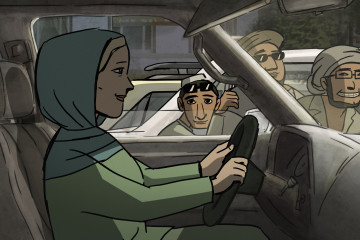

How far are you willing to go for love? How would you feel being thrown into a different world, where almost none of the rules you are familiar with are in place? How much would you struggle to keep your own identity intact? These are the three main questions tackled by My Sunny Maad, an astonishing animated feature helmed by Prague-born director and animator Michaela Pavlátová.
A nominee for the Golden Globe for Best Animated Feature, the film was recently screened at the Göteborg Film Festival (28 January-6 February 2022) and won the prestigious Jury Prize at last year’s Annecy International Animated Film Festival, one of the world’s most important gatherings of its kind.
"Pavlátová’s animated gem is a necessary viewing, capable of telling us, with the right dose of candour and ruthlessness, how fragile and precious our lives are"
Based on investigative journalist Petra Procházková’s novel Frista and adapted for the big screen by Ivan Arsenyev and Yaël Giovanna Lévy, this intriguing Czech-French-Slovakian co-production revolves around a Czech woman, called Herra (voiced by Zuzana Stivínová).
During her university years at the Faculty of Economics in Prague, she meets and falls in love with Nazir (Haji Gul Asir), an Afghan man. In the early 2010s, the couple moves to the war-stricken, post-Taliban Kabul, knowing little about the country and the family she is about to live in.
The family embodies the different “souls” of Afghanistan, featuring a wide range of well-developed characters, whose choices and attitudes are often complex, and at times very difficult to justify.
We will get acquainted with Nazir’s conflicted, captious mother (Nadia Lokanwal); his good-natured grandfather, gifted with a forward-thinking mindset (Abdullah Ebrahimkhail); his tormented sister Freshta (Shamla Masqoodi); her very conservative, violent husband Kaiz (Mohammad Aref Safai) and their four children.
Such complexity is also evident through Nazir’s multifaceted personality. He is portrayed as a caring man who, however, does not hesitate to exercise a heavy influence on his wife’s existence, driven by his jealousy and fearing his community’s judgement. Thus, Nazir is far from being considered infallible and an ideal husband, but he has at least posed certain moral barriers, which make him very different from Kaiz, who is determined to make his young daughter Roshangol (Maryam Malikzada) marry against her will.
In the backdrop, Pavlátová depicts a divided society, wherein its citizens question the reasons for the US intervention, express contrasting feelings towards the Talibans’ past rule or simply wish to move on with their lives. It is also a place where it is hard for a man with good academic credentials to seek adequate employment and play his much-desired role of breadwinner.
Later on, Nazir will end up working as a driver for an American NGO, whilst Herra will manage to get a good job in which she is tasked to provide language assistance to a team of aid workers. Predictably, her position requires her to speak alone with men and this causes much friction with Nazir.
The main narrative turning point takes place when a relative brings an abandoned child called Mohammad, nicknamed Maad (a daring Shahid Maqsoodi), and pushes Herra and Nazir to adopt him since she is infertile. The boy, who seems to suffer from a progeria-like condition, is incredibly clever, witty and mature for a child his age.
Adversity made him stronger, and viewers will find out why. The presence of Maad shakes up the entire family but the boy, for the first time in his life, feels finally loved and protected. Herra and Maad gradually form a strong bond, as they both perceive themselves, to different extents, as outcasts.
My Sunny Maad is also a powerful feminist tale, since it stages its female characters with realism and sincerity, trying to empathise with both the ones who wish to emancipate themselves – for example, Herra and Roshangol – and the ones who are submissive such as Freshta.
Technically speaking, the picture boasts a very stylised, plain drawing style, rich in warm colours. Somehow, it is an aesthetic choice that is neither too childish nor adult-orientated, but it certainly doesn’t mark a lack of vision or refinement.
On the contrary, such an approach keeps the story lucid and easy to follow, with the potential to please a wider crowd, including both younger and older audiences. The moving ending scene is the fair reward of a beautiful viewing experience, and it makes My Sunny Maad a compelling tale about the force of love.
In these dark days during which Ukraine and Russia are at war and the world faces a new phase of uncertainty, Pavlátová’s animated gem is a necessary viewing, capable of telling us, with the right dose of candour and ruthlessness, how fragile and precious our lives are.
Davide Abbatescianni is an Italian Film Critic and Journalist based in Cork, Ireland.
Follow him on Twitter: @dabbatescianni






 Follow the Middle East's top stories in English at The New Arab on Google News
Follow the Middle East's top stories in English at The New Arab on Google News


